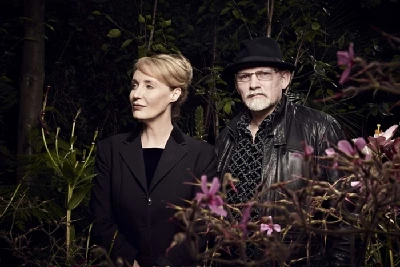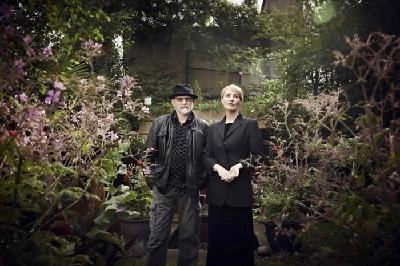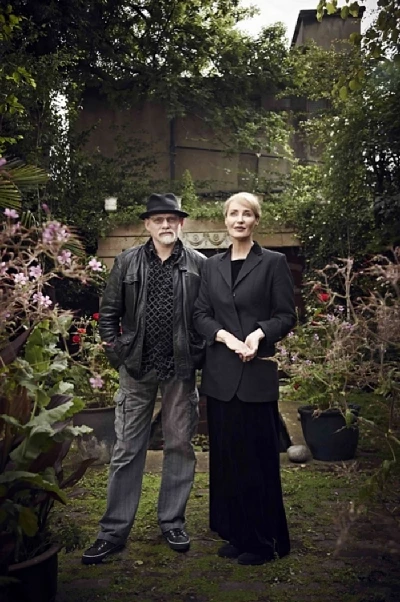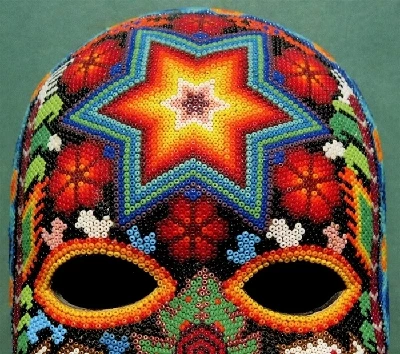published: 24 /
12 /
2018

Brendan Perry from Dead Can Dance talks to John Clarkson about 'Dionysus', his group's first album in seven years, which is a concept album about the legend of the Greek god Dionysus.
Article
A band that inhabit their own world, Dead Can Dance have across nine albums created a series of epic and lush soundscapes that incorporate African polyrhythms, folk elements, Gregorian chants, Middle Eastern influences and art rock.
The music of the duo, which features Australian Lisa Gerrard and the Whitechapel-born Brendan Perry, has often been inspired by folk traditions from across the world and the centuries, and ‘Dionysus’, their latest album and first concept record, is about the Greek God Dionysus, who often associated with hedonism and debauchery, was originally an agrarian deity. It looks at the different sides of the Dionysus legend and the cults that extended around it.
Perry, the album’s composer, plays all the instruments, many of which come from the Mediterranean and are hundreds of years old, including piercing wind instrument the zourna, traditional Bulgarian string instrument the gadoulka and ancient Greek harp the psaltery
‘Dionysus’ also uses field recordings from across the world including chanting, beehives from New Zealand, bird calls from Latin America and a Swiss goatherd with his flock.
The always extraordinary Gerrard’s improvised vocals are confined to the second half of the record, and come to the fore in its last segment when she takes on the role of the agrarian Dionysus returning to water’s underworld to re-assume the role of a guide to dead souls.
Pennyblackmusic spoke to Brendan Perry about ‘Dionysus’ and some of its themes.
PB: Your viewpoint of Dionysus was very much based on Christian morality and in your own words “tainted” until you read Nietzsche’s ‘The Birth of Tragedy’. How did that change your perspective?
BP: It changed my perspective in that a lot of the associations with Dionysus tend to be, although very colourful, quite negative. They focus on hedonism and a darkness and a kind of violence that are associated with going beyond one’s limits with over-indulgence. All these negative aspects are pretty much still concurrent today if one thinks of Bacchus or Dionysus. When I read Nietzsche’s book ‘The Birth of Tragedy’ that kicked me off wanting to know more about the myth of Dionysus, so I read three more books and realised that Dionysus is a very complicated deity that has been added to and changed over a period of about a thousand years.
It originally started as an agrarian nature deity, and then that ended up being celebrated by a cult hundreds of years later in Rome. The cult was outlawed because it was considered decadent and a danger to the state and subversive. It is a far different story than what we have been left with. A lot of the negativity is obviously the consequence of Christianity super imposing its religion onto the big cults at the time including the Dionysian cults. Ironically they also took many Dionysus traits and added them to Christ’s character as well.
PB: The Dionsyus myth originated 2,800 years ago, yet at one level this record seems very contemporary, based very much on the present as much as it is in the past. What do you see as being the main ways in which Dionysus is still relevant in these times?
BP: Well, simply in terms of celebrating nature. Festivities originally associated with Dionysus have become over the centuries rural festivities that are performed by country people who are celebrating, for example, a Spring planting or the coming of the harvest or the winter seasons.
PB: One of the things that 'Dionysus' seems to suggest is that humankind still seems to need rituals. Would you agree with that?
BP: Yeah, it is this old age thing. Why does man need to invent gods continually? What is this quest for believing that there is something greater, beyond our sensibilities and our comprehension, beyond what science shows us? It is bound up in that really, but I think that from a rural perspective people have a very different relationship with nature and I think that they have this connection which people from organised societies don’t have. Time rules their lives differently and they are much more aware of the working of the seasons and how they celebrate it is very different too. It is amazing that humans still have this connection, a sense of awe and wonder of nature.
PB: One of the major themes of the album is that music can be found everywhere in some form. The album includes chanting, bee hives from New Zealand, bird calls from Latin America and a Swiss goatherd at one point. How did you source those field recordings?
BP: That was from the Internet. There are lots of websites with copyright free usage. They were recordings made by enthusiasts ranging from people using recorders to some people just using their Smartphone to record something from nature, elements that they think is particularly beautiful. I didn’t really have the time to go out and get exactly what I wanted. You are kind of spoiled though nowadays. It is very easy to go out and get something approximating what is in your imagination. If you are looking for ocean sound, sea sounds, for instance, you can go through hundreds of sound files until you find the right one, that happens to have a creaking wooden ship with the ropes tightening. It is all part of the process.
PB: Did you put these sound recordings on to highlight the idea that music is in all places?
BP: Partly, especially the ones such as the goats, for instance. That recording of these hundreds of goats coming through a mountain pass with all these bells around their necks is beautiful. There is so much musicality there in itself. Things that are a bit more testing on the human ear,things like white noise, the wind, there are harmonics in there, if you really listen closely. Every sound has a musicality that you can arrange in your mind.
PB: Lisa Gerrard only appears in four of the seven parts of the album. You also play all the instrumentation. Why did you decide to release it as a Dead Can Dance album rather than as a solo album with her as a special guest?
BP: Previous Dead Can Dance albums have been arranged like that. I have done most of the work and the theme. I always start them off, arrange things.If Lisa doesn’t want to bring any music or songs, which has happened a lot in the past I write music for her. You can argue if she is a guest vocalist or part of the group in that sense, but that is the way we have worked together for years now. It is nothing new.
PB: All Dead Can Dance’s albums to date have been predominantly about extending emotion beyond the boundaries of language and finding common ground amongst that. Would you agree with that?
BP: There is a kind of quest for finding the universal, universal principles, the universality of human species in the things that we have in common with one other and probing those rather than the things which keep us apart, negativity, racism, borders, nationalism, patriotism. That is certainly a dynamic in what we do, and that is why at times we don’t use language in a literal sense and use music in an universal sense.
PB: Final question. You’re going to be touring Europe in May and June. What can audiences expect from these shows?
BP: I talked to Lisa about it, and we thought that it would be really good to go back and visit some of the material that we actually did on studio albums but we never performed live. We only did a fraction of what we recorded, so whenever we went on tour we would try out of a lot of material and improvise things. These songs never saw the light of day beyond their release so that is what we are going to do, celebrate our musical legacy and take a handful of songs from each album and write some new material to bring it up to date.
PB: Thank you.
Band Links:-
http://www.deadcandance.com
https://www.facebook.com/DeadCanDanceO
https://twitter.com/dcdmusic
Picture Gallery:-


